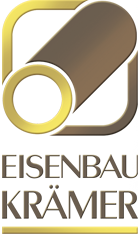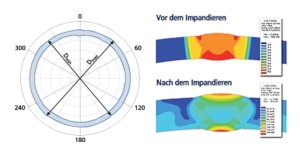
EBK Cryo
As the worldwide demand for energy resources change, so do the requirements of the chemical, LNG and oil & gas industries as related to steel pipes. Recognising these developments, Eisenbau Krämer has continued to develop its range of low temperature and cryogenic steel pipes to include:
ASTM A203, Grades A – F (3.5% Nickel)
ASTM A353 (NN+T) & A553 (Q&T) (8% & 9% Nickel steels)
Alloy 36 (36% Nickel)
Longitudinally welded steel pipes are manufactured by EBK to these and additional specifications for use in applications including:
- LNG storage tanks
- LNG carriers
- Jetty lines
- Sub-sea pipelines
- Pipe-in-pipe cryogenic transmission lines
Advanced manufacturing and welding techniques allow high quality, close tolerance pipes to be produced in EBK’s German based pipe mills in the size range:
- Length: up to 43‘ 6“ (13.200 mm)*without circumferential weld.
- Diameter: 14‘‘ to 60‘‘ (355 mm – 1.524mm)*
- Wall thickness: 1/4‘‘ to 2‘‘ (6 mm – 50 mm)*
State of the art manufacturing and welding processes permit EBK to offer mechanical properties in the weld to match those of the parent plate.
Additionally, Eisenbau Krämer can at their Recklinghausen mill offer fabrication, including close tolerance machining and bulkhead installation, to produce complete products, including Pipe-in-Pipe solutions.
EBK Power
The dual goals of the process engineering and energy generation industries of decreasing costs by increasing production efficiency, and of reducing environmental impact, has driven the operating temperatures of production facilities to ever higher levels. As a direct result the technical requirements for steel pipes have similarly been increased to new levels. Research and development undertaken by Eisenbau Krämer resulted in the company being the first in the world to produce longitudinally welded large diameter steel pipes in the normalised and tempered condition, industry approved as an alternative to seamless pipes. Also suitable for use as mother pipes for bends, EBK is able to offer the following steel grades:
ASTM A387 – Grade 91 (X10CrMoVNb 9-1)
ASTM A387 – Grade 92 (X10CrWMoVNb 9-2)
Eisenbau Krämer offers pipes suitable for high temperature service within the following dimension range:
Diameter: 18″-60″ (450 mm – 1500 mm)
Thickness: 9,52 mm – 40 mm
Length max: up to 13.400 mm
A critically important property of high temperature steels is a high resistance to creep rupture. Long term creep testing continues, however, test results from more than 15,000 hours already demonstrates the products suitability, and results from shorter term tests at higher temperatures is available upon request.
Good test results demonstrated the pipes comfortably passed the industry requirements. Eisenbau Krämer’s investment in new heat treatment systems which enable pipes to be annealed above 1,040 °C (1,904 °F), results in materials that are fully austenized and tempered after the longitudinal welding is completed. This heat treatment guarantees the high creep rupture resistance, while simultaneously maintaining high dimensional tolerances.
Additionally, Eisenbau Krämer has exceeded the requirements of ASTM A691 with testing programmes to investigate and document the notch impact toughness, hot tensile strength, hardness etc. of the material, including testing after simulated post weld heat treatment as well as in the ‘as delivered’ (normalised and tempered) supply condition.
Eisenbau Krämer sets a new milestone based on many years of experience in manufacturing pipes made of high temperature steels such as Grade 22, Grade 5 or Grade 9.
EBK Clad
The oil & gas, chemical and mechanical engineering industries are increasingly turning to materials possessing high corrosion and wear resistance properties. Clad materials combine corrosion and wear resistance properties with high strength carbon manganese steels. To satisfy these requirements Eisenbau Krämer manufactures longitudinally welded clad pipes for applications including:
- Gathering lines
- Components in refineries
- Storage tanks
- Chemical plants
- Offshore-pipelines
As a standard, Clad steel pipes are manufactured in the following dimensions:
- Length: up to 42‘ (13.200 mm)
- Diameter: 14‘‘- 56‘‘ (355 – 1.422 mm)
- Wall thickness of the base material: 0.375‘‘ – 2.5‘‘ (9,5 – 63,5 mm)
- Thickness of cladding: 0.06‘‘ – 0.16‘‘
(1,5 – 4,0 mm)
Pipes are manufactured from metallurgically roll-bonded plates. This metallurgical bond guarantees the integrity of the clad pipes throughout subsequent fabrication processes, including the production of bends and other fittings.
A full range of carbon steel grades is available, including the commonly used API 5L and ASTM A516 range, which may also be offered as compliant with sour service requirements. The CRA layer can be produced to a wide range of specifications, including:
Type 304L, 316L, 904L, Alloy 825, Alloy 625
In addition to extensive production test results, the intensive research and development programme undertaken by Eisenbau Krämer has resulted in a remarkably extensive data bank covering the corrosion properties, mechanical values and welding results, which can be made available to clients to assist in developing thoroughly engineered solutions to their project requirements.
The Electro-Slag Welding (ESW) process used by Eisenbau Krämer not only provides homogeneous welding structures with excellent mechanical and corrosion properties, but additionally guarantees low dilusion between CRA and base metal, even at high output rates.
X80 – X100
The offshore oil & gas industry continually looks to reduce the weight of its installations by increasing the strength of materials used.
As a world class supplier of steel pipes, Eisenbau Krämer responded to these challenges by developing and now supplying longitudinally welded steel pipes produced from the latest generation of high strength steels, such as API 5L X80, X80 NACE, X100, X120 and X140, produced in both the TMCP and Q&T supply condition. These products find service in applications including:
Drilling riser, riser pipes, gathering lines, wellhead houses, line pipes, mother pipes for bend
To be successfully implemented into a design, these products need to combine low levels of hardness with reliable and consistent yield strength in both the longitudinal and transverse directions. Additionally, mechanical properties must remain within specification during further fabrication of the finished pipes, including stress relieving heat treatment.
Typical mechanical values taken from EBK pipes are given below:
X80
- Tensile strength Rm: 621 – 827 MPa (in transverse direction)
- Yield strength Rt0.5: 552 – 690 MPa (in transverse direction)
- Elongation A 2“: min. 30%
- CVN energy value: 42/34J at -20 °C (-4 °F)
- Hardness: max. 248 HV10
X100
- Tensile strength Rm: min. 770 MPa (in transverse direction)
- Yield strength Rt0.5: min. 690 MPa (in transverse direction)
- Elongation A 2“: min. 25%
- Hardness: max. 300 HV10
- Low levels of hardness are particularly important to guarantee good toughness properties, while maintaining weight saving mechanical strength.
The table below shows the wide range of dimensions Eisenbau Krämer offers to the market:
- Outside diameter: 16“-48“ (406 – 1.219 mm)
- Length: max. 42‘ (13.200 mm)*
Impanded Pipes
Longitudinally welded large diameter steel pipes are calibrated during the production process in order to meet the pipe tolerances required by the specifications. The higher quality of base materials and the increasing thickness of pipe walls has meant that pipe calibration using standard equipment has become ever more difficult. Furthermore, new pipe material and pipes with high technical requirements such as clad and riser pipes needs a production process designed to produce more precise pipe tolerances to ensure accurate orbital welding on site. In addition, the new orbital welding techniques only achieve satisfying results if limited pipe tolerances are applied.
uIn order to meet the new requirements of the pipe market, the traditional pipe calibration technique for large diameter steel pipes had to be modified to allow limited pipe tolerances to be produced. The main principle of the Impander® technique is to plasticize the pipe body by regularly upsetting the material until the pipe circumference becomes ideal. In contrast to standard pipe calibration, the Impander® technique produces a constant circumferential pressure, plasticizing the base material and thus making the pipe the optimum circular shape required. Furthermore, residual stress to the pipe is reduced by the Impander®technique. In order to realize this technique, a new machine was developed, patented and named Impander®.
The 4-tool Impander® installed at EBK site Dahlbruch is designed for the following application:
- Force: 4 x 40.000 kN
- Pipe length: 20‘ – 44‘ (6.000 – 13.500 mm)
- Pipe diameter: 14“ – 63“ (355 – 1.600 mm)
- Pipe wall thickness: 0.75“ – 3.15“ (19 – 80 mm)
Longitudinal welded pipes produced applying the Impander® technique (impanded pipe®) have the following advantages compared with conventionally calibrated pipes:
- Tighter tolerances over the whole pipe length even after cutting
- Reduced pipe stress
- Higher pipe collapse resistance

Pipes For Mechanical Engineering
Steel Shells for Machinery Applications
We supply pipes for various mechanical engineering applications to customers all over the world in many industries. Mechanical engineering applications usually involve the tightest tolerances. Especially in the field of paper mills, our pipes are used not only as roll barrels but also as complete rolls in certain applications. Our extensively equipped machining centre provides the means by which we satisfy the high demands of our customers.
Non alloy and low alloy Steel
Longitudinally welded steel pipes are manufactured by EBK to these and additional specifications for use in applications including:
Paper machines:
- Felt guide rolls
- Dandy rollers
- Press rollers
- Rewinders
- Yankee cylinders
General mechanical engineering:
- Hydraulic cylinders
- Rope drums
- Yarn
- Windlass
- Beams
- Loom rolls
But, buy college research papers it is likely people will unfollow us because we never shut up.


